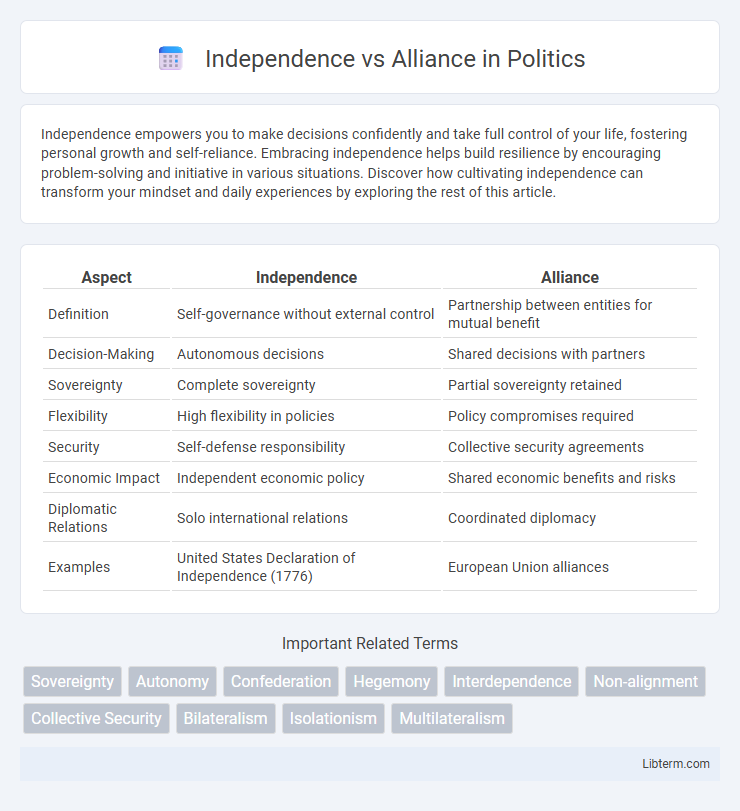Independence empowers you to make decisions confidently and take full control of your life, fostering personal growth and self-reliance. Embracing independence helps build resilience by encouraging problem-solving and initiative in various situations. Discover how cultivating independence can transform your mindset and daily experiences by exploring the rest of this article.
Table of Comparison
| Aspect | Independence | Alliance |
|---|---|---|
| Definition | Self-governance without external control | Partnership between entities for mutual benefit |
| Decision-Making | Autonomous decisions | Shared decisions with partners |
| Sovereignty | Complete sovereignty | Partial sovereignty retained |
| Flexibility | High flexibility in policies | Policy compromises required |
| Security | Self-defense responsibility | Collective security agreements |
| Economic Impact | Independent economic policy | Shared economic benefits and risks |
| Diplomatic Relations | Solo international relations | Coordinated diplomacy |
| Examples | United States Declaration of Independence (1776) | European Union alliances |
Defining Independence and Alliance
Independence refers to the state of self-governance and autonomy, where a country or entity operates without external control or influence, managing its own political, economic, and social affairs. Alliance denotes a formal agreement between two or more parties, often countries, to collaborate for mutual benefits such as security, trade, or strategic support. Defining independence emphasizes sovereignty and self-reliance, while defining alliance highlights cooperation and shared objectives among partners.
Historical Perspectives on Autonomy
Historical perspectives on autonomy reveal that independence often symbolizes a nation's quest for self-determination and freedom from colonial or external control, exemplified by landmark events such as the American Revolution and India's struggle for independence. Conversely, alliances have served as strategic frameworks where states balance sovereignty with collective security and economic cooperation, as seen in NATO's formation and the European Union's integration efforts. These contrasting approaches highlight the ongoing tension between maintaining national autonomy and leveraging shared resources for mutual benefits in global geopolitics.
Key Advantages of Independence
Independence offers the key advantage of complete decision-making autonomy, allowing entities to pursue strategies tailored to their unique goals without external constraints. It enables faster responses to market changes and innovation opportunities, unhindered by the need for consensus or alignment with partners. Moreover, independence preserves full control over resources, profits, and intellectual property, fostering a stronger competitive edge and long-term sustainability.
The Strengths of Strategic Alliances
Strategic alliances offer companies the strength of resource sharing, enabling access to new markets, technologies, and expertise without the need for full mergers or acquisitions. This collaborative approach reduces risks and costs while accelerating innovation and competitive positioning. By leveraging complementary capabilities, alliances create synergies that drive growth and enhance operational efficiency.
Risks and Challenges of Going Solo
Choosing independence in business entails significant risks such as limited resource access, reduced market reach, and heightened financial vulnerability. Without the support of alliances, companies face challenges including increased operational costs and difficulty in scaling. Navigating competitive markets solo demands robust strategic planning and resilience to withstand economic fluctuations.
Potential Pitfalls of Alliances
Alliances often present potential pitfalls such as loss of autonomy, conflicting interests, and dependence on partners, which can undermine strategic goals. Divergent priorities among allies may lead to compromised decision-making and resource allocation, weakening overall effectiveness. Furthermore, misaligned objectives and communication gaps can cause friction, reducing trust and jeopardizing long-term collaboration.
Case Studies: Independent vs Allied Success
Examining case studies reveals that independent nations like Switzerland maintain economic stability and political neutrality by leveraging sovereign decision-making and strong domestic policies. Conversely, allied powers such as the European Union benefit from pooled resources, collective security, and integrated markets, enhancing economic growth and geopolitical influence. Success in independence often hinges on self-sufficiency and internal governance, whereas alliances thrive on cooperation, shared goals, and mutual support.
Factors Influencing the Right Choice
Factors influencing the choice between independence and alliance include economic stability, political autonomy, and security needs. Countries with robust internal resources and governance may favor independence to maintain full control over policy decisions, while those facing external threats or economic challenges often seek alliances for mutual support and shared resources. Historical relationships, cultural compatibility, and geopolitical considerations also play critical roles in determining the optimal strategy for national sovereignty and development.
Evolving Dynamics in Global Relations
Evolving dynamics in global relations reveal a complex interplay between independence and alliance, where nations seek to balance sovereignty with strategic partnerships. Emerging multipolarity challenges traditional hegemonies, prompting states to form flexible alliances that address shared economic, security, and environmental concerns. This shifting landscape underscores the increasing importance of diplomatic agility and multilateral cooperation in maintaining global stability.
Future Trends in Independence and Alliance
Future trends indicate a growing emphasis on strategic independence as nations seek to reduce reliance on alliances amid shifting geopolitical dynamics and technological advancements. However, evolving global challenges such as cybersecurity, climate change, and economic interdependence reinforce the necessity for adaptive alliances that prioritize flexibility and shared innovation. Balancing sovereignty with collaborative frameworks will define future international relations, driving hybrid approaches that blend autonomy with selective partnerships.
Independence Infographic

 libterm.com
libterm.com